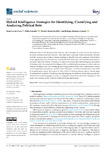Hybrid Intelligence Strategies for Identifying, Classifying and Analyzing Political Bots

Use este enlace para citar
http://hdl.handle.net/2183/29809
A non ser que se indique outra cousa, a licenza do ítem descríbese como Atribución 4.0 Internacional
Coleccións
- Investigación (FIC) [1685]
Metadatos
Mostrar o rexistro completo do ítemTítulo
Hybrid Intelligence Strategies for Identifying, Classifying and Analyzing Political BotsData
2021Cita bibliográfica
García-Orosa, B.; Gamallo, P.; Martín-Rodilla, P.; Martínez-Castaño, R. Hybrid Intelligence Strategies for Identifying, Classifying and Analyzing Political Bots. Soc. Sci. 2021, 10, 357. https://doi.org/10.3390/socsci10100357
Resumo
[Abstract] Political bots, through astroturfing and other strategies, have become important players in recent elections in several countries. This study aims to provide researchers and the citizenry with the necessary knowledge to design strategies to identify bots and counteract what international organizations have deemed bots’ harmful effects on democracy and, simultaneously, improve automatic detection of them. This study is based on two innovative methodological approaches: (1) dealing with bots using hybrid intelligence (HI), a multidisciplinary perspective that combines artificial intelligence (AI), natural language processing, political science, and communication science, and (2) applying framing theory to political bots. This paper contributes to the literature in the field by (a) applying framing to the analysis of political bots, (b) defining characteristics to identify signs of automation in Spanish, (c) building a Spanish-language bot database, (d) developing a specific classifier for Spanish-language accounts, (e) using HI to detect bots, and (f) developing tools that enable the everyday citizen to identify political bots through framing.
Palabras chave
Bots
Framing
Hybrid intelligence
Empowerment
Social media
Framing
Hybrid intelligence
Empowerment
Social media
Descrición
This article belongs to the Special Issue Journalism and Politics: New Influences and Dynamics in the Social Media Era
Versión do editor
Dereitos
Atribución 4.0 Internacional






